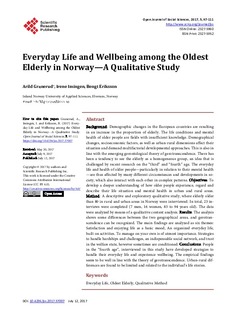Everyday Life and Wellbeing among the Oldest Elderly in Norway—A Qualitative Study
Peer reviewed, Journal article
Published version
Permanent lenke
http://hdl.handle.net/11250/2483916Utgivelsesdato
2017Metadata
Vis full innførselSamlinger
Sammendrag
Background: Demographic changes in the European countries are resulting in an increase in the proportion of elderly. The life conditions and mental health of older people are fields with insufficient knowledge. Demographical changes, socioeconomic factors, as well as urban-rural dimensions affect their situation and demand multifactorial developmental approaches. This is also in line with the emerging gerontological theory of gerotranscendence. There has been a tendency to see the elderly as a homogeneous group, an idea that is challenged by recent research on the “third” and “fourth” age. The everyday life and health of older people―particularly in relation to their mental health ―are thus affected by many different circumstances and developments in society, which also interact with each other in complex patterns. Objectives: To develop a deeper understanding of how older people experience, regard and describe their life situation and mental health in urban and rural areas. Method: A descriptive and exploratory qualitative study, where elderly older than 80 in rural and urban areas in Norway were interviewed. In total, 23 interviews were completed (7 men, 16 women, 83 to 94 years old). The data were analyzed by means of a qualitative content analysis. Results: The analysis shows some differences between the two geographical areas, and gerotranscendence can be recognized. The main findings are analyzed as six themes: Satisfaction and enjoying life as a basic mood, An organized everyday life, built on activities. To manage on your own is of utmost importance. Strategies to handle hardships and challenges, an indispensable social network, and trust in the welfare state, however sometimes are conditioned. Conclusions: People in the “fourth age”, interviewed in this study have developed strategies to handle their everyday life and experience wellbeing. The empirical findings seem to be well in line with the theory of gerotranscendence. Urban-rural differences are found to be limited and related to the individual’s life stories
